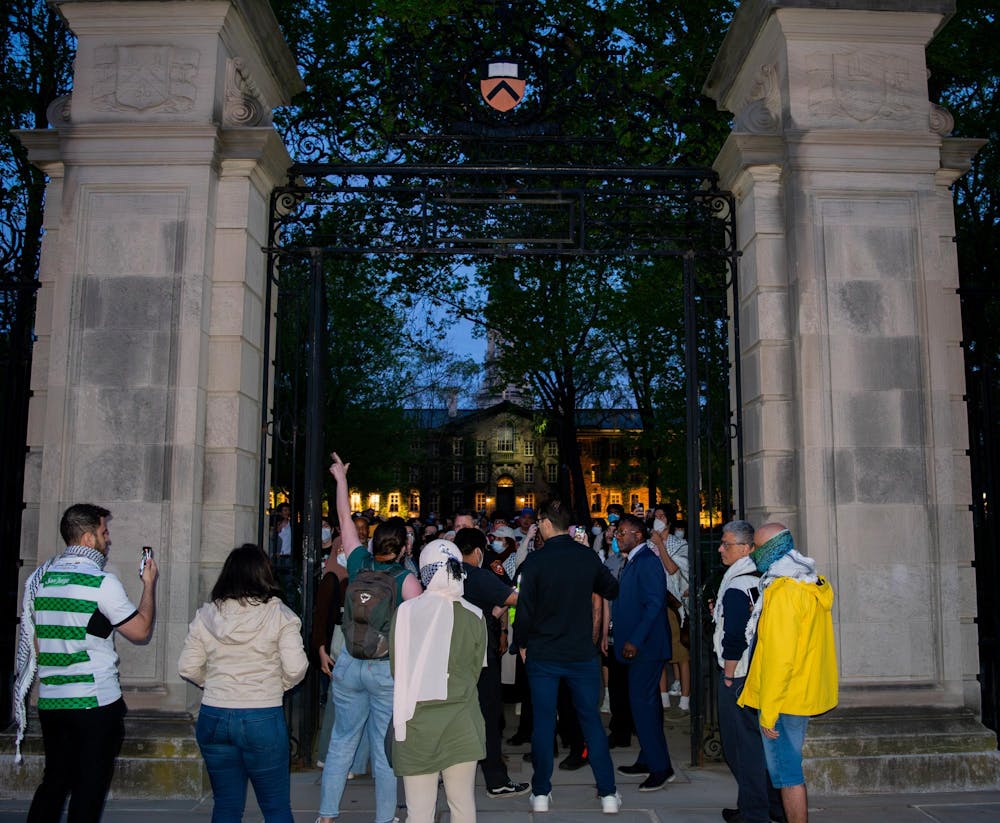In a recent op-ed for Time Magazine, University President Christopher Eisgruber ’83 ostensibly affirms the value of student protest. But reading between the lines, his piece is at best an ambivalent defense of campus activism, vacillating between qualified praise and condescension.
The piece suggests that student protests are just manifestations of misguided youthful zeal, and that, as a vehicle for social change, they’re always inferior to his ideal of rational discussion. Eisgruber describes student movements and protesters, by turns, as “naive,” “ill-considered,” “oversimplified,” and “irritating” — never as courageous, virtuous, or necessary.
This is a radical misinterpretation of American history. Of course, student protests at Princeton and elsewhere run the gamut from substantive to frivolous. But Eisgruber dismisses them all as youthful dalliances, overlooking moments when discussion was not enough to precipitate progress.
Eisgruber tepidly praises the gumption of student protesters — “even when their views are naive or ill-considered” — but never acknowledges that administrators might have something to learn from them. When students sat in at Nassau Hall in 1978 to protest Princeton’s investments in South Africa, University President William Bowen expressed disbelief that the end of apartheid “[was] going to be aided by the withdrawal of a set of corporations and people from South Africa.” History proved him wrong. And few today would condemn the moral vision or tactical strategy of student anti-apartheid protesters — even if they were sometimes disruptive.
The notion that protests aren’t nuanced is particularly important for Eisgruber. He recalls participating in just one as a Princeton undergraduate and writes, “I found it deeply unsatisfying; marching behind placards with oversimplified slogans was not for me.” The one example of activism he highlights in the piece is an incident of crude vandalism bearing little resemblance to the organized campaigns populating Princeton’s history.
This creates a false dichotomy between protest and sophisticated engagement with hot-button issues. The students who shout “Black Lives Matter” — a simple claim with no morally defensible counterargument — at a march can then thoughtfully discuss police violence in precept the next day.
Eisgruber’s greatest error, however, is his characterization of protest as inherently juvenile and unrefined, an expression of half-baked political consciousness. Eisgruber declares that Princeton’s “multiple excellent trustees” who engaged in protests “grew up to be distinguished professionals, model citizens, and influential members of their communities.” Although he commends protesters for their willingness to “take risks … [in] pursuit of a better world,” he suggests that in order to become respectable members of society, they must leave behind protest itself.
He writes that even student protesters with legitimate grievances sometimes make “dumb mistakes,” and administrators should “show enough leniency that these young people can develop and mature as human beings” — and, perhaps, outgrow the instinct to protest. His supposedly benevolent approach to protest is akin to giving a drunk teenager a stern talking-to rather than kicking them out of the house — still hardly an endorsement of the behavior.

In fact, Eisgruber only encourages tolerance of protest because he sees it as equivalent to “debate club” — a college extracurricular that cultivates applicable skills. But activism is not a playground; protesting is not an educational hobby to be discarded after graduation. Unlike debate, it is not about practicing the skill of persuasion. It is about persuading.
And it concretely impacts University policy. As past student movements make clear, reasoned discussion alone can’t correct egregious political injustices. Sometimes, direct action is more productive.
Eisgruber contends that students who “brashly question authority in their youth will need to temper their impudence if they are to be effective leaders as adults.” But the “[brash]ness” and “impudence” of past student movements at Princeton was often integral to their success.
In 2015, the Princeton Black Justice League (BJL) occupied Nassau Hall, pressing for an end to institutional racism at Princeton. In “Terms of Respect,” Eisgruber argues that the protest had “undeniably illiberal aspects,” lamenting the “awful behavior” of activists who used bullhorns to shout over people. But their audacity paid off — not only was their story picked up by national publications, but the protesters got audiences with Eisgruber and other administrators, and many of their demands were ultimately met. They won affinity rooms in the Carl A. Fields Center, and in 2020, the advent of a Culture and Difference distribution requirement and the removal of Woodrow Wilson’s name from the School of Public and International Affairs.

The BJL protests engendered substantive change at Princeton, in part because they made themselves impossible to brush aside. In “Terms of Respect,” Eisgruber writes that leaving the doors of his office open for the BJL was a mistake. Of course, nobody wants to have their office occupied. But Eisgruber’s regret that he didn’t do more to stymie the sit-in only corroborates that the most fruitful campus movements are the ones that the administration has no choice but to take seriously.
This applies to the real world, too. If protests are easy for an oppressive government to ignore, there’s no avenue for regular people to voice specific discontents in an organized manner.
It’s true that protests are not always the most effective medium for nuanced political participation. In fact, sometimes they can be counterproductive, alienating University administrators who were already on the brink of complying with student demands, or inhibiting any change at all by asking for too much.
But those “oversimplified slogans” at which Eisgruber turns up his nose aren’t incompatible with deeper political thought. And student protesters aren’t just foolish kids who will inevitably graduate to a more polite form of politics or fade from public life. Eisgruber is right that “today’s activists may become tomorrow’s leaders.” Many of them are today’s leaders, too.
Head Opinion Editor Frances Brogan is a junior in the History department from Lancaster, Pa. She can be reached at frances.brogan@princeton.edu.








